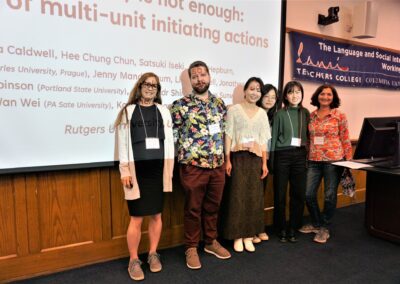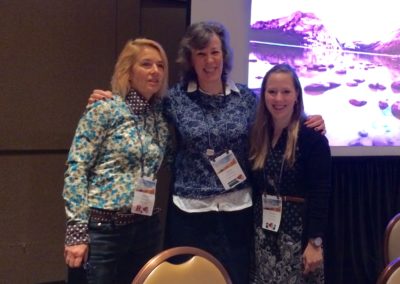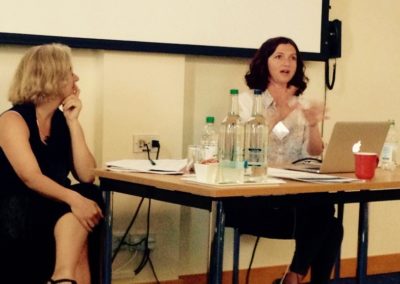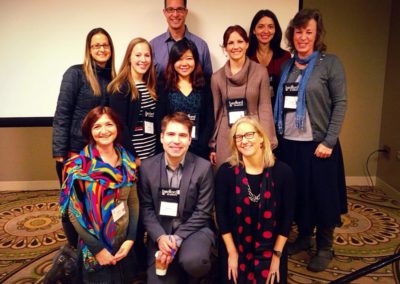Current and past collaborative projects
When one is not enough: The case of multi-unit initiating actions
The conversational turn-taking system, as described by Sacks, Schegloff, and Jefferson, is biased towards turns composed of single turn-constructional units (TCUs). In this project, we explore how and why some turns come to be composed of more than one TCU. More specifically, our focus is on turns in which the current speaker selects next in the first TCU (via a “current selects next” technique) and then continues speaking by adding one or more TCUs, thus producing a multi-unit initiating action. Our data come from a diverse corpus of talk-in-interaction in English, Japanese, Korean, and Russian.
Conference presentations:
- Shirokov, A., Iseki, S., Caldwell, M., Chun, H.C., Sunwoo, H., Zhan, K., Bolden, G., Hepburn, A., Mandelbaum, J., Mikesell, L., Potter, J. & Robinson, J. (2024). When one (TCU) is not enough: The case of multi-unit initiating actions. Paper presented at the NCA 110th Annual Convention: “Communication for Greater Regard,” New Orleans, LA.
- Bolden, G., Shirokov, A., Caldwell, M., Chun, H.C., Iseki, S., Sunwoo, H., Zhan, K., Hepburn, A., Mandelbaum, J., Mikesell, L., Potter, J. & Robinson, J. (2024). When one (TCU) is not enough: The case of multi-unit initiating actions. Paper presented at the 12th annual meeting of The Language and Social Interaction Working Group (LANSI), Teachers College, Columbia University, NYC.
- Sunwoo, H., Caldwell, M., Chun, H.C., Iseki, S., Shirokov, A., Zhan, K., Bolden, G., Hepburn, A., Mandelbaum, J., Mikesell, L., Potter, J. & Lokajova, J. (2024). When one is not enough: The case of multi-unit initiating actions. Paper presented at the 2024 Conference of the International Institute for Ethnomethodology and Conversation Analysis, Seoul, South Korea.
How clinicians simultaneously manage evidence-based decision-making and patient-centered care: The case of ADHD medication titration
This project examines pediatric psychiatry consultations with families whose children had been diagnosed with ADHD and had just started a medication as part of their treatment. Our primary focus is on how clinicians interactionally manage medication titration – the process of determining a medication dose that maximizes symptom control with tolerable side effects. More specifically, we study how pediatric psychiatrists interactionally work to enact two seemingly competing agendas:
1) one agenda is situated in the paradigm of evidence-based medicine, where doctors work to increase the dose
in an incremental fashion as recommended by the clinical guidelines;
2) the other agenda is to enact patient-centered care where they work to invite families to participate in the decision.
We analyze interactional practices clinicians use to enact and balance both agendas.
Investigators (alphabetical): Lisa Mikesell, Aleksandr Shirokov
Conference presentations:
- Shirokov, A., Mikesell, L. (2024). Making evidence-based decisions while practicing shared decision-making: The case of ADHD medication titration in pediatric psychiatry consults. Paper presented at the NCA 110th Annual Convention: “Communication for Greater Regard,” New Orleans, LA.
- Mikesell, L., Shirokov, A. (2024). Making evidence-based decisions while practicing shared decision-making: The case of ADHD medication titration in pediatric psychiatry consults. Paper presented at the 12th annual meeting of The Language and Social Interaction Working Group (LANSI), Teachers College, Columbia University, NYC.
“Papa, believe me”: Managing relational and political affiliations in talking about Russia’s invasion of Ukraine
This study examines how people manage relationships despite having serious political differences. More specifically, we analyze how people manage relational and political affiliations when talking about Russia’s invasion of Ukraine. This task has become incredibly challenging for Ukrainian-Russian and Russian families since the invasion started. To address the issue, Misha Katsurin created a project, “Papa Believe Me,” which offers a guide on how to speak to Russians who have been indoctrinated by years of propaganda. He also published a recording of a conversation with his father that we are analyzing in the project. We examine how the son (who lives in Ukraine) leverages their personal relationship to get the father to “believe” his version of events and how the father (who lives in Russia) enacts personal affiliation (caring for his family) while withholding political alignment. The project aims to shed light on how families manage political disagreements while maintaining relationships.
Investigators (alphabetical): Galina Bolden, Aleksandr Shirokov
Presentations:
- Bolden, G. & Shirokov, A. “Papa, believe me”: Managing relational and political affiliations in talking about Russia’s invasion of Ukraine. Paper presented at the online workshop “Conflict and Dialogue.”
Retracting the unsaid: Using repair to manage delicate actions
This project explores “pre-emptive retraction,” a practice whereby speakers retract something they haven’t said, thereby over-exposing an error that hasn’t been made, in the context of doing word search repairs. We show that by producing the problematic word in the context of a retraction, speakers can provide a ball-park solution to a problem of speaking, without being held accountable for its problematic implications. This practice thus allows speakers to introduce a delicate characterization or description while disclaiming personal responsibility for it, and to head off potentially problematic (and projectable) hearings. Our research builds new observations about the nature of word search repairs, and the way that over-exposed elements such as pre-emptive retractions can be deployed not only as a vehicle for fixing a trouble in speaking but can also for detoxifying incipient problems of understanding by recipients in a similar way to other types of over-exposed repairs.
Conference presentations:
- Hepburn, A., Bolden, G., Potter, J., Mandelbaum, J., Mikesell, L., Zhan, K., Sunwoo, H., Shirokov, A., Licciardello, D., Kurlenkova, A., Caldwell, M., & Chun, H.C. (2022). Retracting the unsaid: using repair to manage delicate actions. Paper presented at the NCA 108th Annual Convention: “Honoring PLACE: People, Liberation, Advocacy, Community, and Environment,” New Orleans, LA.
- Zhan, K., Sunwoo, H., Shirokov, A., Kurlenkova, A., Licciardello, D., Caldwell, M., Chun, H.C., Potter, J., Mikesell, L., Mandelbaum, J., Hepburn, A., & Bolden, G. (2022). Retracting the unsaid: using repair to manage delicate actions. Paper presented at the 10th annual meeting of The Language and Social Interaction Working Group (LANSI), Teachers College, Columbia University, NYC.
Over-exposed Self-correction
In bringing to the interactional surface the work it takes to design a turn, self-repairs provide evidence for the normative character of constructing social actions (Jefferson, 1974, 1987; Schegloff, Jefferson, & Sacks, 1977). In doing self-repair, the speaker breaks the progressivity of the turn at talk, thereby exposing a bit of talk as having been inadequate in some way. However, the degree to which an error is exposed (or not) varies. In this project, we analyze a type of self-initiated self-repair in which speakers draw attention to their error in the course of correcting it. In producing such “over-exposed” corrections, speakers not only repair an inapposite formulation, but also repeat and/or comment on the trouble source, thereby further halting the progressivity of the turn. Drawing on a large and diverse corpus of talk-in-interaction in English, we argue that in over-exposing the correction, speakers highlight their accountability for the error in the service of context-specific remedial identity work (cf. Goffman, 1959).
Conference presentations:
- Wei, W., Park, S.H., Zhan, K., Bolden, G., Hepburn, A., Mandelbaum, J., Mikesell, L. & Potter J. (2019). Over-exposed Self-correction. Paper presented at the 9th Meeting of the Language and Social Interaction (LANSI) Working Group, Teachers College, New York City, NY.
- Zhan, K., Wei, W., Park, S.H., Bolden, G., Hepburn, A., Mandelbaum, J., Mikesell, L. & Potter J. (2019). Over-exposed Self-correction. Paper presented at the 2019 Annual conference of the National Communication Association, Baltimore, MD.
- Bolden, G., Hepburn, A., Potter, J., Mandelbaum, J., Mikesell, L., Park, S.H., Wei, W. & Zhan K. (2020). Over-exposed Self-correction. Paper presented at the 2020 Annual conference of the International Communication Association.
- Bolden, G., Hepburn, A., Mandelbaum, J., Mikesell, L., Potter, J., Caldwel, M., Chun H.C., Kurlenkova, S., Licciardello, D., Park, S.H., Shirokov, A., Wei, W. & Zhan K. (2021). Over-exposed Self-correction. Paper presented at the 17th International Pragmatics Conference, Winterthur, Switzerland.
- Bolden, G., Hepburn, A., Potter, J., Caldwel, M., Chun H.C., Kurlenkova, S., Mandelbaum, J., Mikesell, L., Park, S.H., Shirokov, A., Wei, W. & Zhan K. (2022). When social evils surface: Over-exposed self-correction in the management of incipient attributional trouble. Paper presented at the 72nd Annual conference of the International Communication Association, Paris, France.
The gratitude opportunity space
This project examines the use of expressions of gratitude (e.g. “thank you”) in conversation to demonstrate that the precise timing of gratitude expressions has implications for coordinating social actions and managing relationships. We introduce the concept of the gratitude opportunity space, a normative time for expressing gratitude. Our analysis of sequences involving a provision of assistance via an object pass identifies three phases within the gratitude opportunity space (pre-delivery, on-delivery, and post-delivery) and examines distinct social actions gratitude expressions accomplish within and outside the gratitude opportunity space. Additionally, we explore expressions of gratitude in other social activities (such as gift-giving) and show that the gratitude opportunity space is sensitive not only to the affordances of the physical environment, but also to the turn-by-turn organization of talk, the organization of activities, and participants’ interactional histories.
Investigators (alphabetical): Galina Bolden, Darcey deSouza, Alexa Hepburn, Jenny Mandelbaum, Lisa Mikesell, Song Hee Park, Jonathan Potter, Aleksandr Shirokov, Wan Wei, Kaicheng Zhan
Conference presentations:
- Park, S.H., Searles, D., Wei, W., Zhan, K., Bolden, G., Hepburn, A., Mandelbaum, J., Mikesell, L., & Potter, J. (2018) Gratitude in recruitment sequences. Paper presented at the 2018 Annual conference of the National Communication Association, Salt Lake City, UT.
- Park, S.H., Zhan, K., Wei, W., Searles, D., Potter, J., Mikesell, L., Mandelbaum, J., Hepburn, A. & Bolden, G. (2018) Gratitude in recruitment sequences. Paper presented at the 8th Meeting of the Language and Social Interaction (LANSI) Working Group, Teachers College, New York City, NY.
- Zhan, K., Wei, W., Searles, D., Potter, J., Park, S.H., Mikesell, L., Mandelbaum, J., Hepburn, A. & Bolden, G. (2018) Gratitude in recruitment sequences. Paper presented at the 5th International Conference on Conversation Analysis, Loughborough, UK.
Responding with “I know” in English conversation
An investigation of the use of I know as a responding action. The main finding is that it claims to accept the grounds of the initiating action but either resists that action as unnecessary or endorses it, depending on the epistemic environment created by the initiating action. First, in responding to actions that presume an unknowing addressee (e.g., correcting, advising), speakers deploy I know to resist the action as unnecessary while accepting its grounds. Second, in responding to actions that presume a knowing addressee (e.g., some assessments), speakers use I know to endorse the action, claiming an independently reached agreement (in this way, doing “being on the same page”). Data are in American and British English.
Student investigators (alphabetical): Alexa Bolaños, Stephen DiDomenico, Darcey Searles, Wan Wei
Faculty investigators (alphabetical): Beth Angell, Galina Bolden, Jenny Mandelbaum, Lisa Mikesell, Jeffrey Robinson, Tanya Romaniuk
Publication: Mikesell, L., Bolden, G. B., Mandelbaum, J., Robinson, J. D., Romaniuk, T., Bolaños-Carpio, A., Searles, D., Wei, W., DiDomenico, S. M., & Angell, B. (2017). At the Intersection of Epistemics and Action: Responding with I Know. Research on Language and Social Interaction, 50(3), 268–285. https://doi.org/10.1080/08351813.2017.1340711
Conference presentations:
- Bolaños, A., DiDomenico, S., Searles, D., Wei, W., Angell, B., Bolden, G., Mandelbaum, J., Mikesell, L., Robinson, J., & Romaniuk, T. (2014). At the Intersection of Epistemics and Agreement: Responding with “I know.” Paper presented at the 2014 Annual conference of the National Communication Association, Chicago, IL.
- Romaniuk, T., Bolaños, A., DiDomenico, S., Searles, D., Wei, W., Angell, B., Bolden, G., Mandelbaum, J., Mikesell, L. & Robinson, J. (2015). “I know” what you mean: Agreement and epistemics in action. Paper presented at the 14th International Pragmatics Association Conference, Antwerp, Belgium.
Co-remembering activities in English and Russian conversation
Memory is a central epistemic resource, yet the interactional organization of shared remembering is largely unexplored. Drawing on a large corpus of video- and audio-recorded interactions in English and Russian, we examine a collection of over 50 cases in which participants are engaged in the activity of co-remembering. We show that memory formulations are commonly used as an evidential method to legitimize or support a claim or point of view in contexts of challenges, objections, disagreements, skepticism, resistance and when alternative positions are on the floor. Our study indicates that in deploying memory formulations, interactants rely on the robust character of excavatable shared past experiences to provide an upgraded epistemic claim to support a contentious stance toward an alternative position.
Investigators: Galina Bolden, Jenny Mandelbaum, and undergraduate Aresty students.
Publication: Bolden, G. B., & Mandelbaum, J. (2017). The use of conversational co-remembering to corroborate contentious claims. Discourse Studies, 19(1), 3–29. https://doi.org/10.1177/1461445616683593
Doing being family – Enacting and constructing “family” through interaction
Investigators: Jenny Mandelbaum, Stephen DiDomenico, Darcey Searles, Wan Wei, and undergraduate Aresty students
Interactions between people suffering from severe mental illnesses and their medical and social service providers
Investigators: Beth Angell, Galina Bolden, Alexa Hepburn.
Publications:
- Bolden, G., Angell, B. & Hepburn, A. (2019). How clients solicit medication changes in psychiatry. Sociology of Health and Illness, 41(2), 411-426.
- Bolden, G. & Angell, B. (2017). The organization of the treatment recommendation phase in routine psychiatric visits. Research on Language and Social Interaction, 50(2), 151-170.
- Angell, B. & Bolden, G. (2015). Justifying medication decisions in mental health care: Psychiatrists’ accounts for treatment recommendations. Social Science & Medicine, 138, 44-56.
- Bolden, G., Hepburn, A, & Angell, B. (in press). Engaging with clients’ requests for medication changes in psychiatry. In Lindholm, Camilla, Stevanovic, Melisa, & Weiste, Elina (Eds.). Joint decision making in mental health: An interactional approach. London: Palgrave Macmillan.
- Angell, B. & Bolden, G. (2016). Team work in action: Accounting for psychiatric medication decisions in assertive community treatment. In M. O’Reilly and J. Lester (Eds.), Handbook of Adult Mental Health: Discourse and Conversation Studies (pp. 371-393). London: Palgrave.
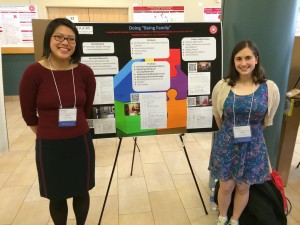
- Aresty students Esti Mellul and Betsy Chao, working with Jenny Mandelbaum, Darcey Searles and Wan Wei, present their poster “Doing being family”
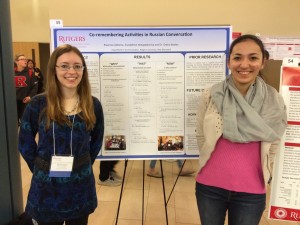
- Aresty students Eleonora Zaitseva and Ziyodakhon Abdujabborova, working with Galina Bolden, present their poster “Co-remembering activities in Russian conversation”

